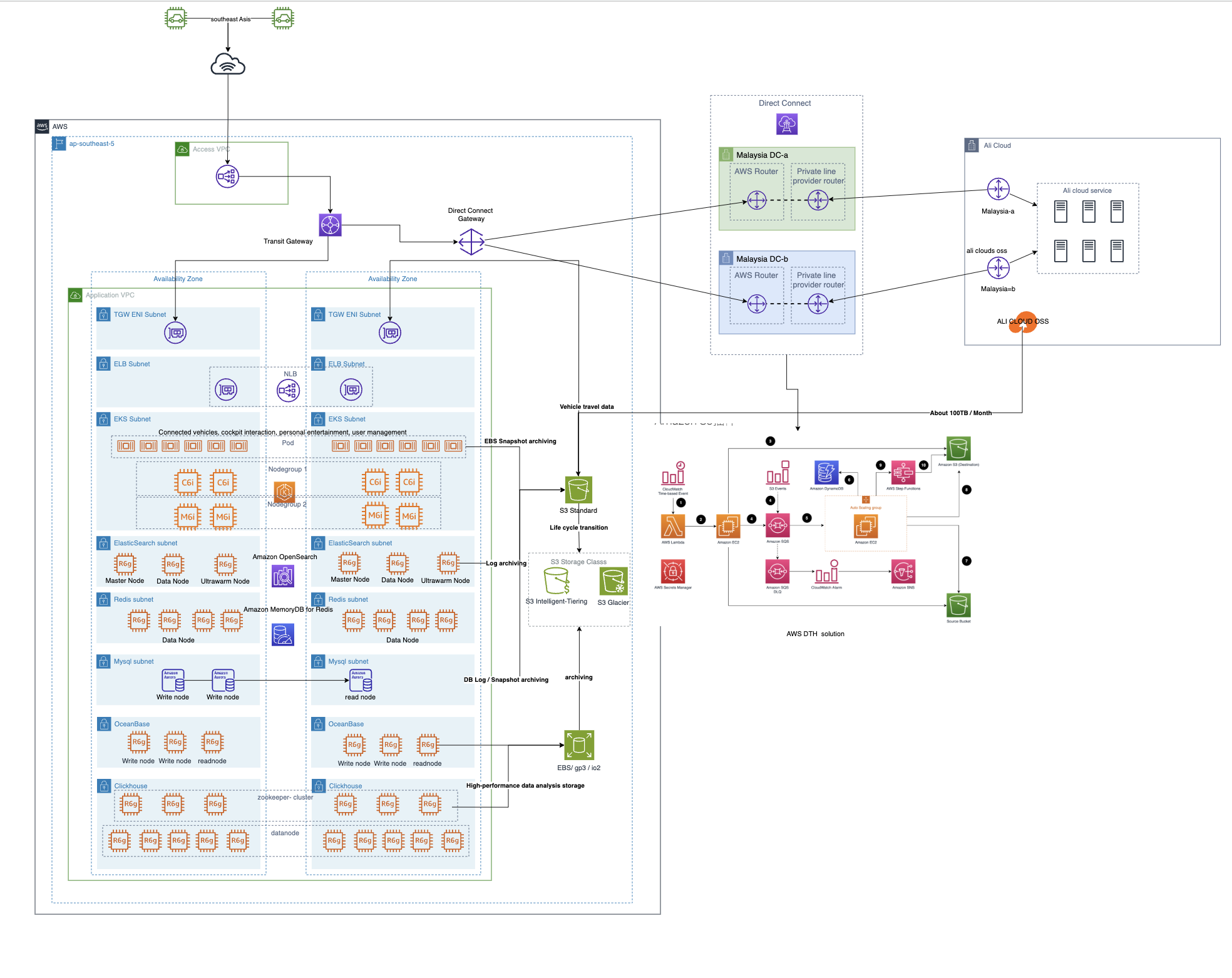TaxisMap - An Internet provider serving well-known OEM automotive companies
Cloud-Native Primary Storage Solutions on AWS for Automotive IoT
Transforming vehicle connectivity and data management across Southeast Asia with scalable AWS storage solutions

Customer Background
TaxisMap Technologies Limited
TaxisMap Technologies Limited was established in Malaysia in 2020. They provide services for OEM manufacturers in the automotive field, such as Toyota, Honda are their customers, currently in Southeast Asia, there are tens of thousands of cars connected to the car networking system in their car networking service system, TaxisMap and AWS in 2025 Q1 reached a comprehensive strategic cooperation, on the one hand, Through the resource capabilities of AWS infrastructure, the overall vehicle networking solution is formed to enhance its overall service competitiveness in the world. Secondly, relying on the overseas advantages of AWS, we will promote the establishment of the customer globalization system and promote the landing of customer-related solutions.
Customer Challenges
TaxisMap faced multiple technical and operational challenges that hindered their ability to scale and maintain compliance in the global automotive IoT market.
Storage Scalability and Cost Management Challenges
Taxismap's autonomous driving platform processes terabytes of sensor data daily from test vehicles, but its legacy storage architecture lacked automated tiering and lifecycle policies. All data—regardless of usage frequency—was retained in the same storage tier, resulting in rapid growth of storage volume and escalating costs. Without efficient archiving mechanisms, cold and historical datasets occupied valuable high-performance storage, creating long-term cost inefficiencies.
Data Compliance and Regional Governance Risks
As Taxismap expanded globally, its Internet of Vehicles system faced stricter regulatory requirements such as GDPR and local data residency laws. However, the previous storage setup lacked region-specific controls, including data encryption enforcement, access auditing, and automated policy application. These gaps increased compliance risk and hindered the company's readiness for international market deployment.
High-Performance Storage Limitations for Vehicle Telemetry
The core telemetry database for Taxismap's Internet of Vehicles system requires extremely low-latency and high-throughput storage to handle real-time ingestion from connected vehicles. Under the previous infrastructure, the storage layer frequently became a performance bottleneck, struggling to sustain the high IOPS needed during peak data bursts. This led to delays in data availability, affecting both backend analytics and critical real-time driving assistance applications.
AWS Solutions - Primary Storage Solutions on AWS for Automotive IoT
TaxisMap leveraged comprehensive AWS storage and data management services to build a scalable, secure, and cost-effective automotive IoT platform.
Scalable, Durable, and Cost-Efficient Primary Storage on Amazon S3
Taxismap leverages Amazon S3 as the central primary storage platform to manage massive volumes of autonomous driving and vehicle telemetry data. With 99.999999999% durability, S3 ensures long-term data resilience while meeting the high-throughput access requirements of connected vehicle applications. Intelligent tiering policies (e.g., S3 Intelligent-Tiering and Glacier) automatically move infrequently accessed data to lower-cost storage classes, significantly reducing overall storage expenses. Compared to the legacy on-premises setup, S3 eliminates infrastructure management overhead and enables seamless scaling as data volume grows.
Integrated Storage Migration and Backup Pipeline Using S3 and EBS
To support large-scale data processing and archiving, Taxismap built a cloud-native storage backbone using Amazon S3 and Amazon EBS. EC2-based compute clusters write processed data directly to S3 for persistent storage and downstream analytics, while latency-sensitive workloads leverage high-IOPS EBS volumes. During cloud migration, nearly 200 TB of primary vehicle data was transferred from OSS to S3 using AWS Direct Connect and Data Transport Hub, minimizing downtime and ensuring continuity. With this setup, backup success rates exceeded 99%, and automated workflows reduced recovery times by over 70%, establishing a more resilient and efficient data lifecycle.
TaxisMap AWS Architecture

Benefits to Customers
The AWS-powered solution delivered significant improvements in performance, cost efficiency, and operational resilience for TaxisMap's automotive IoT platform.
Improved Performance and High Availability
Tens of thousands of vehicles across Southeast Asia can now access the platform through the nearest edge network, reducing average RTT latency from over 100 ms to under 60 ms and improving response performance by 40%. With Amazon EC2 and the high-reliability backbone of Amazon VPC, cloud infrastructure stability has increased by 30%. No major faults or jitter have been reported since deployment, ensuring consistent uptime for core services.
Cost Optimization with Tiered Storage and Efficient Compute
By adopting Amazon S3 Intelligent-Tiering and Glacier for cold data archiving, storage costs were reduced by nearly 30%. Amazon EBS (io2/gp3) met the demanding performance needs of real-time applications and analytics workloads while maintaining predictable cost. The log analytics platform, enhanced through OpenSearch and integrated with S3 for cold/hot data tiering, saw a further 30% cost reduction.
Enhanced Operational Efficiency and Data Resilience
Operational efficiency significantly improved with automated snapshot backups and archival strategies based on Amazon S3. RDS and ElastiCache Multi-AZ deployments now ensure highly available replication and meet strict SLA requirements (≥99.9%). In addition, the introduction of centralized monitoring and dashboarding via Amazon CloudWatch and OpenSearch Dashboards reduced MTTR and improved visibility across all environments.
